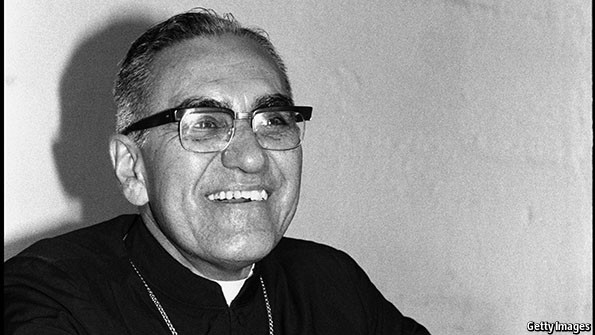A new sort of religious radical
Catholicism and liberation theology

Aug 20th 2014, 13:26 by B.C.
IS LIBERATION theology—an ideological movement that emerged in Latin America in the 1970s and sought to combine Catholicism with revolutionary socialism—making a comeback? Pope Francis has made at least two gestures this month which may lead people to exactly that conclusion. Yesterday, on a flight back from South Korea, the pontiff expressed his admiration for a left-wing martyr: Óscar Romero (pictured), a former Archbishop of San Salvador who was murdered after saying mass in 1980. Francis confirmed that the process of elevating the slain bishop to the status of "blessed", which had been bureaucratically blocked till a year ago because of the cleric's suspected Marxist leanings, should now proceed swiftly. The pope said:
“For me Romero is a man of God...there are no doctrinal problems and it is very important that the beatification [elevation to blessed status] be done quickly.”
Two weeks ago the pope rehabilitated a (still living) figure from the era of liberation theology who is in some ways even more controversial. Father Miguel d'Escoto Brockmann was foreign minister in Nicaragua's revolutionary government from 1979 to 1990. In 2007 he was asked by the Qaddafi regime in Libya to be its representative at the United Nations; and a year later, he became president of the UN General Assembly and sharply criticised Western thinking about "humanitarian intervention".
Inevitably he was caught up in the ideological warfare that was raging in the Catholic church, and in the wider world, during the final stage of the cold war. In 1984 Pope John Paul II suspended him from carrying out his priestly duties because he refused to give up his ministerial post. This month Pope Francis agreed to lift the ban, and the 81-year-old priest, who is reportedly deaf and infirm, was able to say mass again.
So where does this leave liberation? Thanks to the arresting gestures he has made in favour of the poor and marginalised, and his often sharp critique of the rich, powerful and trigger-happy, Francis has already become the most popular pope on the religious left since Pope John XXII died in 1963.
http://www.economist.com/blogs/erasmus/2014/08/catholicism-and-liberation-theology
